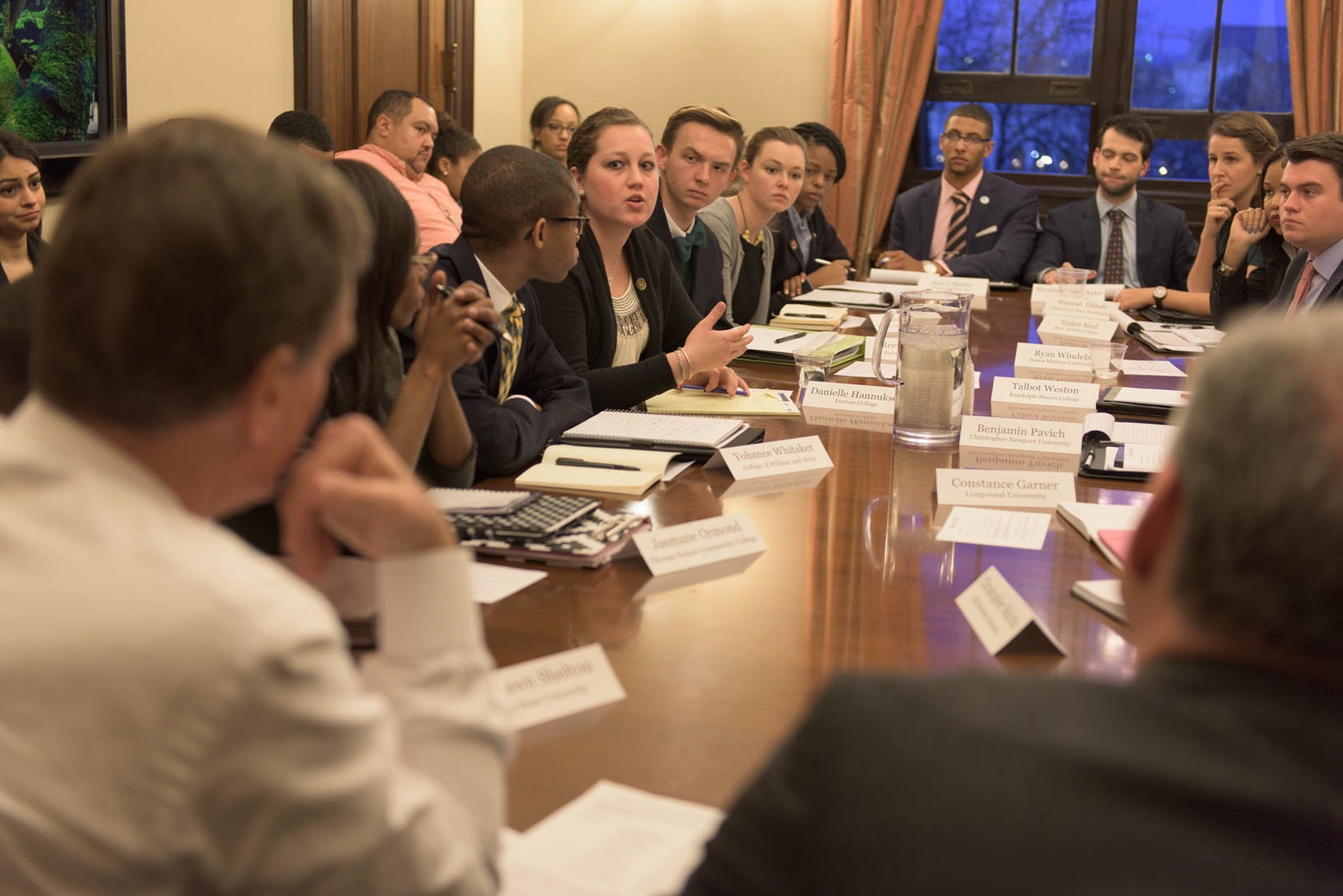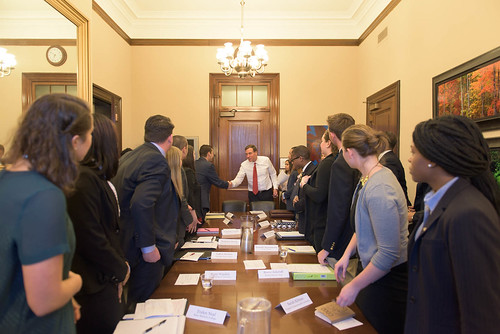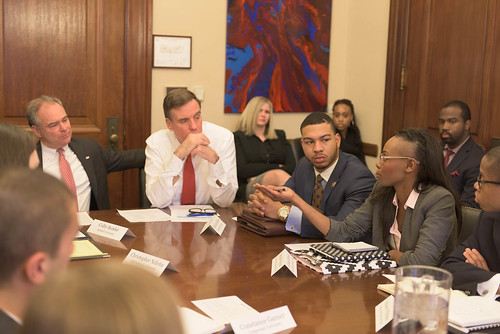WASHINGTON – Constance Garner works two jobs while attending college, but her long hours aren’t to line her pockets with extra beer money.
WASHINGTON – Constance Garner works two jobs while attending college, but her long hours aren’t to line her pockets with extra beer money.
Garner, a Longwood University senior, expects to graduate owing more than $35,000 in student debt; she works two jobs on campus to cover room and board.
“I am from a very small town in southern Virginia where students are lucky to receive any type of higher education, much less a bachelor’s degree from a four-year institution,” Garner said.
Stories like hers aren’t uncommon – and last week, U.S. Sens. Mark Warner and Tim Kaine, both former governors of Virginia, hosted a roundtable discussion in the nation’s capital with student leaders from 20 Virginia colleges to discuss the increasing financial burdens of pursuing higher education.
“Sen. Warner and I hosted this roundtable to hear directly from student leaders at universities and colleges across Virginia on ways we can help alleviate the burden of student loan debt, which has surpassed credit card debt in America,” Kaine said.
Nationwide, Americans owe more than $1.3 trillion in student loan debt, which is more accumulated non-mortgage debt than credit cards and auto loans, according to the Federal Reserve.
Warner noted that about 60 percent of Virginia college students graduate with student debt and that the average debt load in Virginia now tops $26,000 per graduate.
“As the first person in my family to complete college, I know that if I had graduated with today’s levels of student debt, I would not have had opportunities to try – and to fail – with several of my early business ventures,” Warner said.
Kaine and Warner, both of them Democrats, have worked to pass bipartisan legislation in Washington. For example, Warner has teamed with Florida Sen. Marco Rubio, a Republican presidential candidate, to sponsor the “Student Right to Know Before You Go Act,” which would provide tools for comparing colleges and universities on measures such as total cost, likelihood of graduating and potential earnings.
The issue of college affordability varies by state and by institution. Virginia’s 15 public four-year colleges and universities and 24 community colleges depend on funding in the state budget approved by the General Assembly.
This year is critical for higher education, as legislators consider Gov. Terry McAuliffe’s proposed 2016-18 budget.
A poll released in January by the Commonwealth Educational Policy Institute at Virginia Commonwealth University found solid public support for financing both K-12 and higher education.
“Most people don’t think current high school graduates are ready to succeed in the workplace,” said Robyn McDougle, CEPI interim executive director. “For some, attending college is the next key step toward a career, but these responses suggest that the public supports a high school structure that provides career skills that match up with a student’s vision for his or her future and the needs of employers.”
According to the institute’s survey, about two-thirds of Virginians think high school graduates are not prepared for the workplace but are prepared for college. More than 70 percent of respondents support restructuring high school to make employer-aligned skill sets for a student’s desired career the focus of grades 11 and 12.
The poll indicated that the public sees community colleges as an advantage in adequately preparing students for the workforce. Almost three-fourths of the respondents said community college graduates are ready to join the workforce; a slightly higher proportion said the same thing of graduates of four-year colleges and universities.
Under McAuliffe’s proposed budget, education and health and human services would receive the most sizable portions of state funding in the upcoming biennium.
“I don’t know that it’ll help things go over more smoothly, but it’s always good to have nonpartisan data,” McDougle said.
McDougle said that in creating the poll, the CEPI collaborated with Peter Blake, director of the State Council of Higher Education for Virginia, and Anne Holton, Virginia’s secretary of education.
“Following the economic recession, our schools have been struggling to do more and more with less and less,” she said.
Holton said McAuliffe has traversed Virginia and heard from teachers, students and parents concerned about the future of education in Virginia.
“That is why his proposed budget includes over $1 billion in new, innovative investments for our public schools, colleges and universities,” Holton said. “The governor and I are committed to improving educational opportunities, supporting our fantastic educators and paving the way for every student to succeed in the new Virginia economy.”
Higher education officials hope this legislative session goes more smoothly than two years ago when a partisan stalemate over the state budget for the 2014-16 biennium prompted schools to increase tuition and fees across the board.
Due to the legislative impasse, public colleges and universities had to adopt their budgets for the 2014-15 school year not knowing how much funding the state would give them.
As a result, VCU raised tuition and fees 3.3 percent for in-state students – and that was the smallest boost among the state’s major research universities. The increase was 4.3 percent at the University of Virginia, 4.8 percent at George Mason University and 4.9 percent at Virginia Tech.
Later in 2014, things got even worse. The state government discovered it had a budget shortfall of $880 million, and McAuliffe ordered state institutions to cut their budgets 5 percent for fiscal year 2015 and 7 percent for the following year.
VCU President Michael Rao relayed the bad news in an email to the university community: “Now we face $8.75 million in cuts to the budget for the fiscal year that has already begun, increasing to $12.25 million in cuts for fiscal year 2016.”
College officials hope to avoid similar problems during the next budget cycle.
-30-
Higher Ed Funding: By the Numbers
Here is how much each state-supported institution of higher education is receiving this fiscal year (2016) from the state’s general fund and the increase proposed by Gov. Terry McAuliffe for 2017, according to the Virginia Department of Planning and Budget. (The enrollment numbers are from the State Council of Higher Education for Virginia.)
Christopher Newport University
2016 appropriation: $30,680,321
2017 intro changes: $2,224,189
2017 total: $32,904,510
Current student enrollment: 5,172
College of William and Mary
2016 appropriation: $43,739,360
2017 intro changes: $3,624,884
2017 total: $47,364,244
Current student enrollment: 8,484
George Mason University
2016 appropriation: $142,881,281
2017 intro changes: $11,728,847
2017 total: $154,610,128
Current student enrollment: 34,112
James Madison University
2016 appropriation: $81,996,990
2017 intro changes: $7,502,701
2017 total: $89,499,691
Current student enrollment: 21,227
Longwood University
2016 appropriation: $29,395,815
2017 intro changes: $2,269,003
2017 total: $31,664,818
Current student enrollment: 5,087
Norfolk State University
2016 appropriation: $51,211,803
2017 intro changes: $5,227,372
2017 total: $56,439,175
Current student enrollment: 5,107
Old Dominion University
2016 appropriation: $132,697,173
2017 intro changes: $13,146,329
2017 total: $145,843,502
Current student enrollment: 24,672
Radford University
2016 appropriation: $54,275,371
2017 intro changes: $5,038,016
2017 total: $59,313,387
Current student enrollment: 9,743
University of Mary Washington
2016 appropriation: $27,258,203
2017 intro changes: $2,660,842
2017 total: $29,919,045
Current student enrollment: 4,647
University of Virginia
2016 appropriation: $137,099,157
2017 intro changes: $8,513,861
2017 total: $145,613,018
Current student enrollment: 23,883
University of Virginia at Wise
2016 appropriation: $16,035,000
2017 intro changes: $1,601,911
2017 total: $17,636,911
Current student enrollment: 2,028
Virginia Commonwealth University
2016 appropriation: $199,048,008
2017 intro changes: $15,533,523
2017 total: $214,581,531
Current student enrollment: 31,242
Virginia Military Institute
2016 appropriation: $13,605,980
2017 intro changes: $931,431
2017 total: $14,537,411
Current student enrollment: 1,717
Virginia Tech
2016 appropriation: $174,543,831
2017 intro changes: $14,383,976
2017 total: $188,927,807
Current student enrollment: 32,663
Virginia State University
2016 appropriation: $38,796,332
2017 intro changes: $2,768,558
2017 total: $41,564,890
Current student enrollment: 4,696
Virginia Community College System
2016 appropriation: $405,711,667
2017 intro changes: $37,936,964
2017 total: $443,648,631





